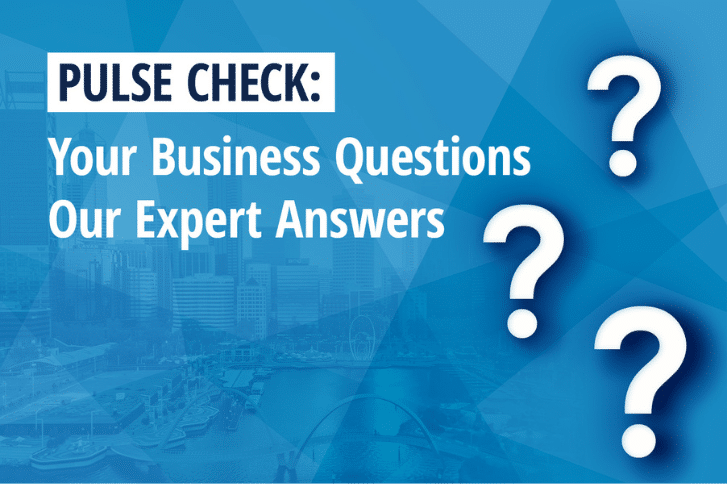Does your business have strategies in place to support employee mental health at work? Our Mental Health in the Workplace Webinar looked at how you can get started.

Mental health is as important as ever, with the COVID-19 pandemic forcing workplaces to look more closely at mental health amid changing working habits and higher levels of anxiety and depression.
In the Wellbeing Lab 2019-2021 Australia Workplace Report, managing mental health was the second biggest struggle for employees at work at 28.85 per cent in 2021. In 2020 it was 35.3 per cent.
And in PricewaterHouseCoopers research looking at the reasons that employees consider leaving their job, the impact on their mental health was cited by 29 per cent, on par with lack of career growth and wanting a change. Lack of personal fulfilment came in first at 30 per cent.
CCIWA Employee Relations Advice Centre Manager Siobhan Griffiths says now is not the time to be complacent, but the best time to make sure you have strategies in place to continue to support employees with their mental health at work.
Why is it important to invest in mental health strategies in the workplace?
Investing in a mentally healthy workplace can provide benefits to businesses such as:
- Increased motivation and engagement
- Retention
- Reduced absenteeism
- Presenteeism
- More attractive Employee Value Proposition
How do I get started?
There are a few things you can do to get started with a mental health strategy.
1. Review the current workplace, including roles and responsibilities
2. Access risk factors to mental health such as:
- chronic stress caused by workload
- rostering systems
- lack of support or consistency
- conflict in the workplace, including bullying and harassment
- poorly managed change
- lack of recognition and reward
- organisational injustice
3. Protective factors that can protect employee mental health (often the opposite of risk factors)
- Clear roles and job descriptions
- Reward and recognition structures
- Organisational support at different levels
- Healthy feedback systems
- Healthy relationships
- Social connection
- Diversity, equity and inclusion.
“It's important to note that these sorts of protective factors are usually displayed and reinforced at an individual level within teams, and between black supervisors or managers as well. So they can have real impact there,” Griffiths says.

The importance of relationships
Griffiths stresses the importance of relationships between supervisors or ‘people managers’ and their staff.
She says workplaces can be a transformative environment for employees if managers take the time to get to know their employees, invest in training and trust them with tasks.
“Every new employee who starts a job wants to contribute in some way; they want to be included,” she says.
"That desire in itself can be transformed to reaching their potential or becoming a high performer.”
She highlights three key factors to consider: Inclusion (I belong); Connection (I contribute with purpose); and Trust (I’m treated with care and respect).
“This is what underpins sustainable, high performing teams,” he said.
Griffiths says there are three personal attributes that a people manager or supervisor can use to drive performance and create a psychologically safe workplace:
- Empathy (listening and trying to understand where someone's coming from)
- Unconditional positive regard (respect for the other person, regardless of their role, or work in the organisation)
- Congruence (authenticity, or being a genuine person)
“It does not mean that any employee is not accountable for their actions or shortcomings. It just means that they can be addressed in a safe place together, so the employee can learn, grow and develop and come to their manager with their problems,” she says.
Practical steps to protect employee mental health
ERAC’s Eve Vasilas highlights three core principles for a mentally healthy workplace, as developed by the National Workplace Initiative.
- Protecting employees’ mental health. Identify and manage work-related risks to mental health.
- Addressing mental health conditions. Identify and support people who are experiencing mental health illnesses.
- Promoting wellbeing. Enhance positive aspects of work that contribute to staff mental health wellbeing.
“Having these focus areas in mind will help workplaces ensure that they cover all aspects of mental health when developing initiatives or strategies around mental health wellbeing in the workplace,” Vasilas says
Mental health intervention
Mental Health First Aid Australia describes three levels of mental health intervention.
- Prevention. Interventions that are appropriate for those who are well or have very mild symptoms.
- Early intervention. Those that are appropriate for those with very mild symptoms or who are developing a mental health illness.
- Treatment. Where a person has made the decision to seek help.
PART TWO: DEVELOPING A MENTAL HEALTH STRATEGY

Our Employee Relations Advice Centre is also available to respond to your questions on (08) 9365 7660, or via [email protected].













